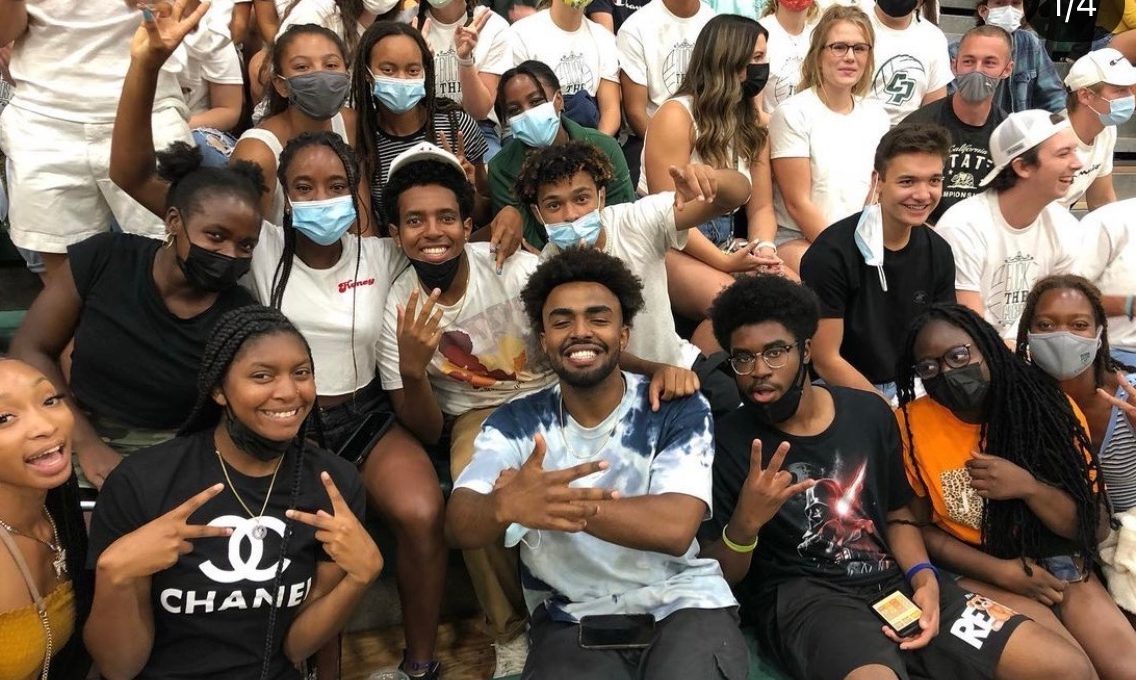
Cal Poly’s Black Student Union (BSU) and the Black Academic Excellence Center (BAEC) are holding several events throughout February celebrating Black History Month.
Black History Month is observed every February to honor the legacy of Black Americans and foster discussions and awareness of Black history. Every United States president since Gerald Ford in 1976 has officially recognized the celebration.
The 2022 Black History Month calendar can be found on BSU’s or the BAEC’s Instagrams. Every event is public to the Cal Poly community except for Feb. 11’s Food of the African Diaspora potluck and Feb. 19’s Black Love Premiere, which are private BSU/BAEC celebrations.
The BSU will also notify students about changes to the calendar and promote Black History Month events by other groups around San Luis Obispo on their Instagram.
“It is an opportunity for us to have creative community on campus to celebrate each other,” BSU President and architecture senior Chloe Wardrick said.
Wardrick said she is excited to focus on aspects of Black history that aren’t usually covered in-depth. Events she highlighted in particular are the College of Liberal Arts Teach-In on Feb. 17 and the State of Blackness on Feb. 24, which includes a signature event panel.
“[We want people] to understand the experiences of Black and African American individuals at Cal Poly,” Wardrick said.
Not yet on the calendar is a university-wide screening of a Black history movie, which BSU is still planning in partnership with ASI.
“We will definitely be excited to share something to the wider campus of Cal Poly,” Wardrick said.
Amid the celebration, the Cal Poly Housing Instagram page (@cp_housing) sparked community disapproval on Feb. 1 when they posted a now-deleted photo recognizing Black History Month and invited students to view their Instagram stories to read about “Black history and achievements,” but only highlighted Abraham Lincoln and Frederick Douglass in their caption. They stated that February is Black History Month due to Lincoln’s Feb. 12 birthday and did not mention Black Americans.
“It is a poor reflection of the university’s mission to foster a diverse, equitable, and inclusive environment if marginalized voices and accomplishments continue to be suppressed,” English freshman Kendall Taylor wrote in a message to Mustang News.
Taylor previously commented on the post that it was “unbelievably tone-deaf — you demean Blackness through a white normative lens as you celebrate a white man in the discussion of black achievement.”
Several other students criticized the page’s decision.
“There are so many other Black voices you could have highlighted in this caption …. delete this and do better,” @yazmeentrinity also wrote.
After the post wasn’t altered, BSU contacted University Housing directly.
“We had to take [matters] into our own hands and email some of the higher-ups within Housing to notify them since the post was not being taken down in the manner that we thought it should,” Wardrick said. “It was a little bit frustrating, coming from Black interest organizations and entities on campus, that we were not looped into Cal Poly Housing plans and this Black history campaign.”
Wardrick said they asked Housing to contact BSU in advance about future campaigns so they can promote them and make sure there is no misinformation.
“We just want people to grow from that experience and know that we are a resource as well as that we exist as [an organization] on this campus, specifically to enhance the Black conscience at Cal Poly,” Wardrick said. “Cal Poly Housing now knows that there are other routes to be taken and hopefully that will happen in the future.”
By Feb. 2, Housing edited the caption to mention Carter G. Woodson, an early-20th century historian who is known as “the father of Black History” after establishing a “Negro History Week” in February 1926.
“We acknowledge our previous post has caused unintentional harm and we are committed to continuous learning and unlearning in an effort to be partners in uplifting, supporting, and centering Black voices,” the new caption read. “We also recognize Black History month as an opportunity to critically examine how we work to uphold this pledge with meaningful and informed action throughout all months in the year.”
They later deleted the post entirely.
Wardrick said organizations like Cal Poly Housing should highlight aspects of Black History Month that are specific to their areas of expertise — for example, educating students on San Luis Obispo policies that have prevented Black families from buying property.
“Make it more of a niche topic and stick with it rather than just saying ‘happy Black History Month,’” Wardrick said. “That would be the biggest way in which Cal Poly can start to grow and honestly stand by its goals to become a more diverse, equitable and inclusive environment.”
Cal Poly BSU was founded in 1968 as the first Black interest club on campus and currently has about 60 paid members. The BAEC aims to support “the advancement and excellence of Black students and Black student groups” at Cal Poly by sharing available campus resources to Black students, providing Black students with academic supplies, and “retain[ing] and graduat[ing] as many Black students as possible,” according to their website.
Wardrick encouraged students who are interested in connecting with BSU to reach out to them through Instagram.
“I hope people are learning more about the successes of many Black Americans as well as African Americans throughout this month,” Wardrick said.
Photo courtesy:



















